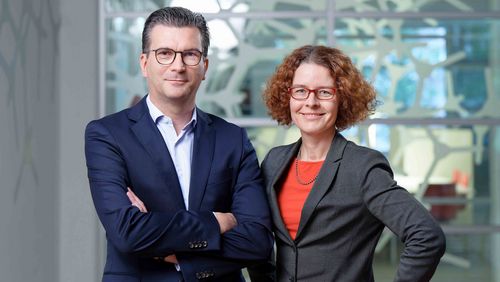
catalaix
Most chemical products are thrown away at the end of their life cycle—an unsustainable practice that Regina Palkovits, Jürgen Klankermayer and their team at RWTH Aachen University want to put an end to. At the WSS Research Centre “catalaix”, they’re developing catalysis-driven production methods to bring about a multidimensional circular economy in the chemical industry.
Converting plastic waste into versatile, high-quality chemical building blocks: at RWTH Aachen University, researchers at the WSS Research Centre “catalaix” are developing catalysis-driven recycling methods that will enable a multidimensional circular economy.
The “catalaix” project was named winner of the ideas competition launched by the Werner Siemens Foundation (WSS) to celebrate its centennial in 2023. The project aim is nothing less than revolutionising the chemical industry—an ambitious undertaking that WSS is supporting with a ten-year grant of one hundred million Swiss francs.
Industrial chemists employ a series of sophisticated methods to manufacture a wide range of products from petroleum-based raw materials. Most of these goods are thrown away at the end of their life cycle—a practice that may soon change thanks to the custom-made catalysts being developed by Regina Palkovits, Jürgen Klankermayer and their team at RWTH Aachen University. Their catalysis-driven processes are capable of breaking down plastics into their basic chemical building blocks—which can then be reused to produce new goods in a multidimensional circular economy.
The team’s first focus is the plastics industry—a sector that consumes vast amounts of energy, emits massive quantities of CO2 and leaves behind mountains of waste. At present, four hundred million metric tons of plastic are produced every year. By 2050, production will most likely rise to a total of sixteen gigatons, which is the combined weight of all humans, animals and fungi living on the planet. Of this, only about nine percent is recycled.
The catalaix team are drawing on a wide range of tools to create a multidimensional circular economy based on an open-loop principle. This means that the molecular building blocks derived via catalysis-driven recycling processes are so versatile that they can be fed into other value chains and material cycles.
Facts and figures
Project leaders
Prof. Dr Jürgen Klankermayer, Chair of Translational Molecular Catalysis, RWTH Aachen University
Prof. Dr Regina Palkovits, Chair of Heterogeneous Catalysis and Technical Chemistry, RWTH Aachen University
Project
Researchers at the WSS Research Centre “catalaix” are developing catalysis-driven methods that will enable a multidimensional circular economy in the chemical industry. Mixed plastic waste is the first research priority of Regina Palkovits, Jürgen Klankermayer and their team at RWTH Aachen University.
Funding from the Werner Siemens Foundation
100 million Swiss francs
Project duration
2024–2034





